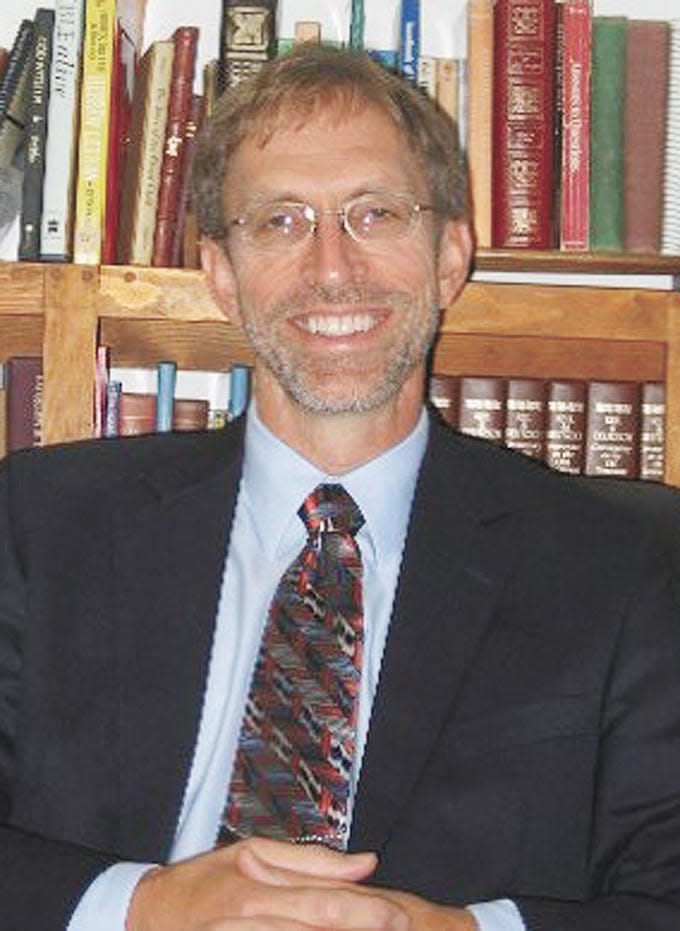Shayne Looper: The love of knowledge, the knowledge of love
- Oops!Something went wrong.Please try again later.
In one of his best-known passages, the Apostle Paul wrote, “For now we know in part.” Human knowledge is always partial. The greatest theologian has only partial knowledge, as does the greatest scientist and the greatest philosopher. Of course, the great theologians, scientists and philosophers understand that. It is the lesser theologians and scientists who don’t know that they don’t know.
Earlier in that same passage, Paul, himself a great theologian, says, “Now we see but a poor reflection as in a mirror.” His choice of metaphors comes directly out of the setting in which he writes. He is sending this letter to a church congregation in first-century Corinth, a large city and one of the ancient world’s leading centers of commerce. Corinth was famous for, among other things, its quality bronze mirrors.

Silvered glass mirrors, such as are used today, had not yet been invented. Though Corinth made some of the world’s finest mirrors, polished bronze produced a very imperfect reflection. Like the knowledge gained by looking into a bronze mirror, our current knowledge is always incomplete.
I suspect that in heaven, everyone will walk around with a red mark on his or her forehead. This has nothing to do with the mysterious “mark of the beast” mentioned seven times in the biblical Book of Revelation. No, this mark will come from flabbergasted saints hitting their own foreheads with the palms of their hands and saying, “Duh! How could I have missed that?”
In that day, all those arguments in which we were certain we were right — theological, political, social — will seem silly to us. When we were most right, there was still something wrong. We never did more than see, to borrow King James English, “through a glass darkly.”
Though we know only in part now, the apostle states plainly that “then I shall know fully.” Why will we know so much more then than we do now? Will we be smarter? Probably. Will we have access to more information? I expect so. Will we know more because we are no longer exposed to deception? Certainly. But there is another, more fundamental reason. We will know more because we will love more.
This passage, 1 Corinthians 13, is sometimes called a “Paeon to Love.” In it, St. Paul emphasizes the supreme importance of love in human life. Among the many ways that love transforms a human life is this: it brings with it knowledge.
People say that love is blind, but nothing could be further from the truth. Infatuation is short-sighted. Lust is blind. But love has 20/20 vision. Love knows. Aldous Huxley said we can only love what we know, but I think the opposite is true: We can only know — really know — what we love.
For example, people will only know God to the degree that they love Him. They can study the Bible, go to seminary, and earn a master of divinity degree, but unless they love God, they will never really know him. The love of knowledge is a great thing, but it is not a replacement for the knowledge of love. Without love, knowledge produces a dead and bloated dogmatism that drives people away from the faith rather than drawing them to it.
Not only can we not know God apart from love, neither can we know our kids, our parents, or our friends apart from love. The ancient Chinese sage Sun Tzu said, “Know your enemy.” But, ironically, the only way to know your enemy is to love him, at which time it is possible he will cease to be your enemy. When Jesus directed us to love our enemies, he opened the door for us to understand them. Love enables knowledge.
In the age to come we will know even as we are known because we will love even as we are loved. And isn’t that what the Teacher told us: “Love one another. As I have loved you, so you must love one another.” Love, which is how God’s life in us relates to others and to everything, is the catalyst for true knowledge. Love is a way — it is the way — of knowing.
— Shayne Looper is a writer and speaker based in Coldwater, Michigan. Contact him at salooper57@gmail.com.
This article originally appeared on The Holland Sentinel: Shayne Looper: The love of knowledge, the knowledge of love

